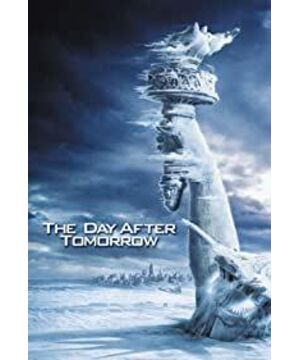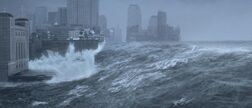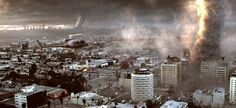The day after tomorrow is a very typical disaster film. Regarding a large-scale irresistible disaster, the crowd fleeing in a panic, symbolizing dangerous animals, compassionate feelings, political factors, and emotional entanglements between the protagonists.
The male protagonist is very smart, and in order to accompany the girl he likes to participate in the competition, he got on the plane that he had been afraid of. He has never spoken out to express his feelings to girls, and he is timidly afraid to speak up when other boys ask girls to play with. But when the disaster happened, an astonishing huge wave rushed into the city and seemed to overwhelm the girl's location, only the male protagonist rushed out to rescue her bravely. In the cold water, the male protagonist tried his best to contact his parents to report that he was safe, but he did not forget to tell his parents to tell the girl's family. When the girl's leg was cut and was not treated in time for high fever, the male protagonist was willing to take a huge risk to find medicine for the girl. The emotional thread is basically over here, so the return of the beautiful woman can be regarded as the standard ending.
The protagonist’s parents seem to have been divorced and separated long ago, and the father was so busy at work that he even forgot to send his son to the airport. I thought this was an unqualified father. It wasn't until the latter part of the film that the power of paternal love began to be highlighted. The father who passed through the storm with his professional knowledge, ability and belief, finally found his son and his companion trapped in the New York library. We finally added a warmth to this sad movie.
The doctor’s mother accompanies her young unattended patient until the ambulance finally comes to transfer the remaining two in the hospital. Is the ruthlessness of the disaster highlighting the greatness of the profession, or the selflessness of the doctor overcoming the tricks of fate? If the last ambulance fails to find the two lagging behind, it may just make the ending unsatisfactory, but perhaps what is more needed in the disaster is such a hope in despair as a beacon.
The ending of the small group of people in the library who are willing to obey the hero's words and stay is far better than the majority of people who go out without authorization to find a way out. This story tells us that the protagonist's halo is very important. But what I want to say here is that the fuel needed for heating in the library is undoubtedly the books in the library. Burning books for heating is a last resort, but some people thought of secretly keeping the first bible printed by Gutenberg, even if humans are there. No matter how difficult it is to survive, it can still retain a little bit of Western civilization. The development of culture and civilization is even higher than the survival of human beings.
It seems that the vice president in all American movies is born to contrast the president. This film is no exception. The vice president pays attention to the economy and pays no attention to environmental changes and possible disasters. In contrast, the president can determine the overall situation and stick to his job until he has to withdraw, but he is finally caught because the time is too late. Trapped in the storm and could not be rescued.
Some people may criticize the emotional lines in this disaster film as too many and too complicated, and too many emotional details are interspersed. Standard disaster movies have always reviewed human nature in disasters and treated the exposed feelings calmly. And the day after tomorrow, it seems to be a ruthless disaster while telling a warm story. The shocking storm cloud image has affected me for a long time, and I still have lingering fears when I see the cloud image when I watch the news and weather forecast. But in any case, it arouses people's awareness of respecting nature and protecting nature. This film conveys it well.
View more about The Day After Tomorrow reviews











